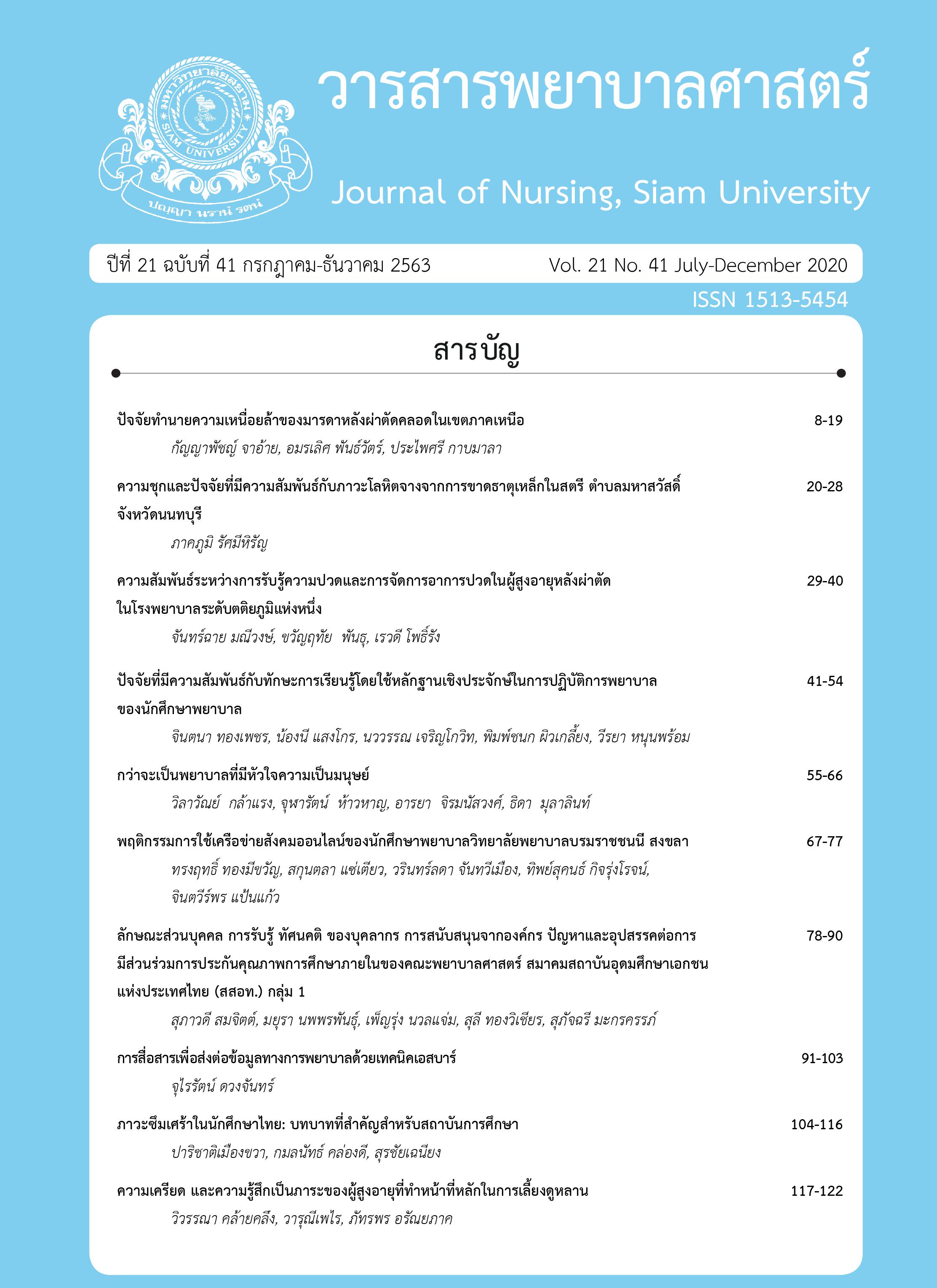ความสัมพันธ์ระหว่างการรับรู้ความปวดและการจัดการอาการปวดในผู้สูงอายุหลังผ่าตัด ในโรงพยาบาลระดับตติยภูมิแห่งหนึ่ง
DOI:
https://doi.org/10.14456/jnsu.v21i41.243306คำสำคัญ:
ความปวด, อาการรบกวนผู้สูงอายุ, การจัดการอาการปวด, ความคาดหวังบทคัดย่อ
การศึกษาครั้งนี้มีวัตถุประสงค์เพื่อศึกษาความสัมพันธ์ระหว่างการรับรู้อาการรบกวนระดับความปวด ความรุนแรงความปวด ความคาดหวังและการจัดการอาการปวดกลุ่มตัวอย่างเป็นผู้สูงอายุหลังผ่าตัดช่องท้อง จำนวน 100 คน จากโรงพยาบาลตติยภูมิแห่งหนึ่งเก็บ ข้อมูลโดยใช้แบบบันทึกข้อมูลทั่วไป แบบวัดความรุนแรงของความปวด แบบสอบถามการรับรู้อาการรบกวน แบบสอบถามความคาดหวังและแบบสอบถามการจัดการอาการปวดวิเคราะห์ข้อมูลโดยการใช้สถิติเชิงพรรณนาหาค่าสหสัมพันธ์ความถี่ ร้อยละ ค่าเฉลี่ย ส่วนเบี่ยงเบนมาตรฐาน พิสัยและค่าสัมประสิทธิ์สหสัมพันธ์ของเพียร์สัน
ผลการศึกษา พบว่าการรับรู้อาการรบกวน และระดับความปวดมีความสัมพันธ์ทางบวกในระดับต่ำต่อการจัดการอาการปวดอย่างมีนัยสำคัญทางสถิติที่ระดับ .05 (r = .039, r = .404 ) และความหวังมีความสัมพันธ์ทางบวกในระดับปานกลางต่อการจัดการอาการปวดอย่างมีนัยสำคัญทางสถิติที่ระดับ .05 (r = .616) ข้อเสนอแนะจากการวิจัยครั้งนี้ พยาบาลควรให้ความสำคัญกับการประเมินและการจัดการอาการปวดอย่างต่อเนื่องและควรพัฒนารูปแบบการจัดการอาการปวดโดยการไม่ใช้ยาเพิ่มขึ้นและในการจัดการอาการปวดหลังการผ่าตัดของผู้สูงอายุควรใช้วิธีการหลายวิธีร่วมกัน เพื่อลดระดับความรุนแรงของอาการปวดอย่างมีประสิทธิภาพ
เอกสารอ้างอิง
เฉียบพลันในโรงพยาบาลรามาธิบดี. รามาธิบดีพยาบาลสาร, 15 (3),303-314.
จุฑารัตน์สว่างชัยและศรีสุดา งามขำ (2560). ความปวดของผู้ป่วยหลังผ่าตัดช่องท้องโรงพยาบาลสวรรค์ประชา
รักษ์. วารสารวิจัยทางวิทยาศาสตร์สุขภาพ, 11 (ฉบับพิเศษ), 1-11.
บุญใจ ศรีสถิตนรากูรม. (2553). ระเบียบวิธีการวิจัยทางพยาบาลศาสตร์. พิมพ์ครั้งที่ 5. กรุงเทพฯ : ยูแอนด์ไอ
อินเตอร์ มีเดีย.
สิริอร ข้อยุ่น, วริศรา ภู่ทวีและอาภา ศรีสร้อย. (2562). ผลของการใช้โปรแกรมการฟื้นตัวหลังผ่าตัดร่วมกับ
เครื่องพยุงเดินหลังผ่าตัด เพื่อป้องกันภาวะแทรกซ้อนหลังผ่าตัดในผ้ป่วยหลังผ่าตัดช่องท้อง. ศรี
นครินทร์เวชสาร, 34(4), 378 – 384.
บุญใจ ศรีสถิตนรากูรม. (2553). ระเบียบวิธีการวิจัยทางพยาบาลศาสตร์. พิมพ์ครั้งที่ 5. กรุงเทพฯ : ยูแอนด์ไอ
อินเตอร์ มีเดีย.
บรรจง จารุวงศ์. (2551). ความปวด การจัดการกับความปวด และผลของความปวดของผู้ป่วยหลังผ่าตัดช่อง
ท้อง ในโรงพยาบาลสรรพสิทธิประสงค์. วิทยานิพนธ์ปริญญา พยาบาลศาสตรมหาบัณฑิต
มหาวิทยาลัยราชธานี.
หน่วยงานห้องผ่าตัด. (2562). รายงานสถิติผู้ป่วยที่ได้รับการผ่าตัด. สุพรรณบุรี :โรงพยาบาลเจ้าพระยายม
ราช.
วัลยาพร คำมอญ, กนกพร สุคำวัง และโรจนี จินตนาวัฒน์. (2557). ผลของการพยาบาลตามทฤษฎี
ความสำเร็จตามจุดมุ่งหมายต่อการฟื้นสภาพหลังผ่าตัดของผู้สูงอายุที่ได้รับการผ่าตัดช่องท้อง. พยาบาลสาร, 41(2), 83 - 96.
อรพรรณ ไชยชาติ,วงจันทร์ เพชรพิเชฐเชียรและศศิธร พุมดวง. (2549). ความรุนแรงของ ความปวด ปัจจัย
สวนบุคลความคาดหวังและความพึงพอใจของผู้ป่วยต่อการจัดการกับความปวดหลังผ่าตัดช่องท้อง
ของทีมสุขภาพ. สงขลานครินทร์เวชสาร, 24(2), 101-109.
Dhesi, J. (2010). Improving outcomes in older people undergoing elective surgery. The
Journal of the Royal College of Physicians of Edinburgh, 40, 348-353.
Dodd, M., Janson, S., Facione, N., Faucett, J., Froelicher, E., Humphreys, J., et al. (2001).
Advancing the science of symptom management. Journal of Advanced Nursing, 33(5),
668-676
International Association for the Study of Pain (IASP) (2019). IASP pain terminology. April 23,
2019.
Momani, M. M. (2016). Gap Analysis between perceptions and expectations of medical-
surgical patients in a public hospital in Saudi Arabia. Medical and Practice, 25(1), 79-
84.
Stephan,M.F., & Esther. P.Z. 2019. Pain therapy to reduce perioperative complications.
Innovative Surgical Sciences, 4(4), 158 - 166.
ดาวน์โหลด
เผยแพร่แล้ว
รูปแบบการอ้างอิง
ฉบับ
ประเภทบทความ
สัญญาอนุญาต
เนื้อหาและข้อมูลที่เผยแพร่ในวารสารพยาบาลศาสตร์ มหาวิทยาลัยสยามถือเป็นข้อคิดเห็นและความรับผิดชอบของผู้นิพนธ์บทความโดยตรง
บทความ เนื้อหา ข้อมูล รูปภาพ ฯลฯ ที่ได้รับการเผยแพร่ในวารสารพยาบาลศาสตร์ มหาวิทยาลัยสยาม ถือเป็นลิขสิทธิ์ของวารสารพยาบาลศาสตร์ มหาวิทยาลัยสยาม หากบุคคลหรือหน่วยงานใดต้องการนำทั้งหมดหรือส่วนหนึ่งส่วนใดไปเผยแพร่หรือเพื่อกระทำการใด ๆ จะต้องอ้างอิงวารสารพยาบาลศาสตร์ มหาวิทยาลัยสยามทุกครั้ง



